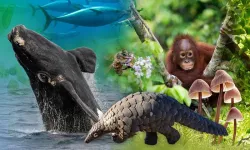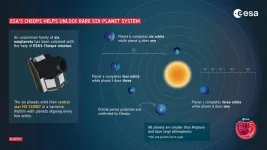(Press-News.org) EMBL’s European Bioinformatics Institute (EMBL-EBI) has launched the Global Biodiversity Portal – an open access data portal that will consolidate genomic information from different biodiversity projects within the Earth BioGenome Project.
Sequencing and storing the genomic data of all species on Earth is vital for future conservation and biodiversity efforts. In an era where biodiversity is under threat from various environmental pressures, there is an urgent need for centralised, accessible, and actionable data. These data allow researchers to understand the genetic factors that make a species unique, including its vulnerabilities and strengths in adapting to changing environmental conditions. The information also has direct applications in agriculture and bioengineering; understanding plant genomes helps the development of more resilient crops and more efficient biofuels.
“The Global Biodiversity Portal is designed to act as a 'super portal,' pulling together sequencing data from biodiversity projects worldwide into a centralised, friendly interface,” said Peter Harrison, Genome Analysis Team Leader at EMBL-EBI. “This allows users to effortlessly search for all the information they need about the species they are interested in.”
"EMBL is deeply committed to understanding the intricate relationships between organisms and their environments at a molecular level," said Josipa Bilic Zimmermann, Planetary Biology Program Manager at EMBL. "The Global Biodiversity Portal provides, in a centralised and easily accessible way, genomic information from species collected across different ecosystems on Earth. It aligns perfectly with the Planetary Biology mission, as the available information contributes to biodiversity assessment, and further genomic analysis will allow better understanding of species evolution and adaptation. Supporting projects like this is important at EMBL, as the genomic blocks of life, in all its diversity, are the basis of any further research in biology."
Global Biodiversity
The Earth BioGenome Project represents a monumental effort to sequence, catalogue, and analyse the genomes of all eukaryotic life forms on Earth. It aims to serve as an invaluable resource for researchers across different disciplines. EMBL’s Global Biodiversity Portal will act as a comprehensive genomic platform to support the Earth BioGenome Project by making the data collected from the numerous projects that make up this wider initiative accessible all in one place.
“Data collected for the Earth BioGenome Project underpin critical scientific insights that will help researchers across the globe find solutions for some of our biggest global challenges, including climate change, disease spread across species, and conservation,” said Mark Blaxter, Programme Lead for Tree of Life Programme and Senior Group Leader at the Wellcome Sanger Institute. “Having these species data easily accessible and openly available to everyone is the fundamental core of this project and this data portal will make it possible.”
Useful features
The Global Biodiversity Portal will act as a central hub for biodiversity information by combining genomic data and metadata in a user-friendly interface that can be easily navigated and searched.
Key features of the Global Biodiversity Portal:
Status tracking: sequencing progress can be tracked using a status tracking feature that includes information on public raw data, assemblies, and annotations for each species. The Genomes on a Tree service tracks the overall Earth BioGenome project progress, including before sampling and sequencing have taken place.
Search flexibility: users will be able to search by common names as well as Latin names, aiding more accessible navigation.
Publications: publications that have used the genomic data collected within the portal are tracked and listed as part of the platform.
Related project data: users will be offered the option to visit project-specific portals for more detailed data.
User engagement: images and species information are provided throughout the portal, making it easy for a non-scientific audience to browse and learn more about different species.
“We are looking to continue to grow the portal by integrating holistic data including detailed locations from where the samples were collected, including climate and geographical information,” said Harrison. “We also want to incorporate data from the IUCN Red List of threatened species to provide information about the endangerment status of specific species to add further value for our users.”
Scalable data access
The portal is designed to serve both scientific and non-scientific communities, with user-friendly options to search for data related to species of interest. Its robust search functionality coupled with dynamic filtering options means that whether you're an expert in genomics looking for specific sequencing data or a conservationist interested in habitat distribution, the portal enables a customisable search experience that brings the most relevant data to your fingertips.
The system behind the Global Biodiversity Portal is designed to convert and standardise data, allowing data harmonisation from the various sources and projects. The system updates multiple times a day, automatically scanning various databases to keep the information as current as possible. The portal is also designed with scalability in mind, both in terms of the amount of data it will handle and the number of users it needs to support as global biodiversity initiatives begin to ramp up.
"This portal represents a significant advancement for the scientific community, providing a comprehensive platform for accessing and sharing vital genomic data," said Camila Mazzoni, Group Leader at the Leibniz Institute for Zoo and Wildlife Research Berlin and Founding Chair of the European Reference Genome Atlas (ERGA). "Our efforts at ERGA have been dedicated to mapping the genomic diversity of European species, and this new data portal will help us expand our vision on a global scale. Through this collaborative effort, we can enhance our understanding of global biodiversity, linking data from various ecosystems to support more effective and informed conservation strategies worldwide.”
Funding
This project was funded by EMBL core funding, as part of the EMBL Planetary Biology Transversal Theme.
END
The Global Biodiversity Data Portal: enabling biodiversity research worldwide
The new initiative brings together genomic data from various biodiversity projects to aid conservation and biodiversity efforts
2023-11-29
ELSE PRESS RELEASES FROM THIS DATE:
Doctors call for expanded reporting of medical care given in ICE detention centers
2023-11-29
Embargoed until November 29 11 a.m. ET
A new study led by Dr. Annette Dekker, an assistant professor in the Department of Emergency Medicine at UCLA, calls for the U.S. Immigration and Customs Enforcement (ICE) detention centers to increase health outcome reporting for detained immigrants to monitor the quality of medical care. Pulling from three different data sources, the researchers found discrepancies in care reported by emergency medical services (EMS) compared to ICE reports.
Building upon work that reviews deaths that occur at ICE detention centers, Dekker and colleagues sought to address concerns that individuals detained by ICE ...
Revisiting gene dosage
2023-11-29
Have you ever wondered why we carry two copies of each chromosome in all of our cells? During reproduction, we receive one from each of our parents. This means that we also receive two copies, or alleles, of each gene – one allele per chromosome or parent.
Both alleles are able to produce messenger RNA, which is the recipe needed to make proteins and keep cells running. Scientists hypothesize that having two alleles for each gene is the cell’s in-built redundancy system. If there is ever a mutation or drop in messenger RNA production from the allele carried on one of the chromosomes, the allele on the second chromosome will serve as a backup and ...
Scientists discover rare 6-planet system that moves in strange synchrony
2023-11-29
Scientists have discovered a rare sight in a nearby star system: Six planets orbiting their central star in a rhythmic beat. The planets move in an orbital waltz that repeats itself so precisely it can be readily set to music.
A rare case of an “in sync” gravitational lockstep, the system could offer deep insight into planet formation and evolution.
The analysis, led by UChicago scientist Rafael Luque, will be published Nov. 29 in Nature.
“This discovery is going to become a benchmark system to study how sub-Neptunes, the most common type of planets outside of the solar system, form, evolve, what are they made of, and if they possess the ...
Disruptive ideas rely on old fashioned meetings
2023-11-29
A marvel of modernity is the ability to collaborate with others regardless of location. Researchers can work with a colleague, maybe the only person who has a specialized skill, even if they are halfway across the globe. They can pull together a powerhouse team with a dozen of the brightest minds in the field.
Yet, according to research from the lab of Lingfei Wu, assistant professor in Pitt’s School of Computing and Information, these collaborative teams are producing fewer truly disruptive ideas or radical innovations than ...
An astronomical waltz reveals a sextuplet of planets
2023-11-29
An international collaboration between astronomers using the CHEOPS and TESS space satellites, including NCCR PlanetS members from the University of Bern and the University of Geneva, have found a key new system of six transiting planets orbiting a bright star in a harmonic rhythm. This rare property enabled the team to determine the planetary orbits which initially appeared as an unsolvable riddle.
CHEOPS is a joint mission by ESA and Switzerland, under the leadership of the University of Bern in collaboration with the University of Geneva. Thanks to a collaboration with scientists ...
Final call for Awards Nominations 2024 of the World Cultural Council
2023-11-29
The World Cultural Council (WCC) is now accepting nominations for the “Albert Einstein” World Award of Science and the “Leonardo da Vinci” World Awards of Arts.
Nominations must be submitted by 26 January, 2024. NOMINATE NOW: To nominate online or for further details of the awards visit the WCC website Nominations page.
Ideal candidates for the “Albert Einstein” World Award of Science are scientists whose achievements can serve as an inspiration for future generations. This award is granted each year. Consideration will be given to ...
BU/VA researcher awarded funding to prevent intimate partner violence
2023-11-29
(Boston)—Casey Taft, PhD, professor of psychiatry at Boston University Chobanian & Avedisian School of Medicine, has been approved for a five-year, $2.8 million funding award from the Patient-Centered Outcomes Research Institute (PCORI) for his research study “A Randomized Controlled Trial to Evaluate a Trauma-Informed Partner Violence Intervention Program.”
Taft, who also is a staff psychologist at the National Center for PTSD in the VA Boston Healthcare System, is conducting a randomized controlled trial of the Strength at Home program to prevent and end intimate partner violence (IPV) in Rhode Island. Strength at Home ...
The act of saying "no" under the linguistic magnifying glass
2023-11-29
FRANKFURT. Prof. Bernhard Brüne, Vice President Research, Early Career Researchers and Transfer at Goethe University Frankfurt, congratulated the researchers involved in the successful application: "Anyone who establishes a major project like a Collaborative Research Center must have both creative and viable research ideas as well as a strong network. To discover new things about language and thinking, the new CRC 1629 not only makes use of Goethe University’s structures, and the combination of philology with philosophy and didactics. It also cooperates with partner universities in Göttingen and Tübingen. Aside that, I am of course delighted that ...
Insilico Medicine showcases latest AI drug discovery platform breakthroughs
2023-11-29
Insilico Medicine (“Insilico”), an artificial intelligence (AI)-driven, clinical stage biotechnology company and leader in AI drug discovery platform technology, is hosting three webinars unveiling its latest technology breakthroughs Nov. 28-30, 2023. These new features are part of the expansion of the Company’s end-to-end Pharma.AI platform and include chat functionality, off-target screening tools, enhanced knowledge graphs and more. They represent major steps forward in the advancement of AI drug discovery.
The company is an early ...
New astrophysics model sheds light on additional source of long gamma-ray bursts
2023-11-29
Cutting-edge computer simulations combined with theoretical calculations are helping astronomers better understand the origin of some of the universe’s most energetic and mysterious light shows — gamma-ray bursts, or GRBs. The new unified model confirms that some long-lasting GRBs are created in the aftermath of cosmic mergers that spawn an infant black hole surrounded by a giant disk of natal material.
Astronomers previously thought that black holes that generate long GRBs typically form when massive ...
LAST 30 PRESS RELEASES:
Ultrasound AI receives FDA De Novo clearance for delivery date AI technology
Amino acid residue-driven nanoparticle targeting of protein cavities beyond size complementarity
New AI algorithm enables scientific monitoring of "blue tears"
Insufficient sleep among US adolescents across behavioral risk groups
Long COVID and recovery among US adults
Trends in poverty and birth outcomes in the US
Heterogeneity of treatment effects of GLP-1 RAs for weight loss in adults
Within-person association between daily screen use and sleep in youth
Low-dose lithium for mild cognitive impairment
Catheter ablation and oral anticoagulation for secondary stroke prevention in atrial fibrillation
A new theory of brain development
Pilot clinical trial suggests low dose lithium may slow verbal memory decline
Bioprinting muscle that knows how to align its cells just as in the human body
A hair-thin fiber can read the chemistry of a single drop of body fluid
SwRI develops magnetostrictive probe for safer, more cost-effective storage tank inspections
National report supports measurement innovation to aid commercial fusion energy and enable new plasma technologies
Mount Sinai, Uniformed Services University join forces to predict and prevent diseases before they start
Science of fitting in: Do best friends or popular peers shape teen behavior?
USF study: Gag grouper are overfished in the Gulf; this new tool could help
New study from Jeonbuk National University finds current climate pledges may miss Paris targets
Theoretical principles of band structure manipulation in strongly correlated insulators with spin and charge perturbations
A CNIC study shows that the heart can be protected during chemotherapy without reducing antitumor efficacy
Mayo Clinic study finds single dose of non-prescribed Adderall raises blood pressure and heart rate in healthy young adults
Engineered immune cells show promise against brain metastases in preclinical study
Improved EV battery technology will outmatch degradation from climate change
AI cancer tools risk “shortcut learning” rather than detecting true biology
Painless skin patch offers new way to monitor immune health
Children with poor oral health more often develop cardiovascular disease as adults
GLP-1 drugs associated with reduced need for emergency care for migraine
New knowledge on heritability paves the way for better treatment of people with chronic inflammatory bowel disease
[Press-News.org] The Global Biodiversity Data Portal: enabling biodiversity research worldwideThe new initiative brings together genomic data from various biodiversity projects to aid conservation and biodiversity efforts







